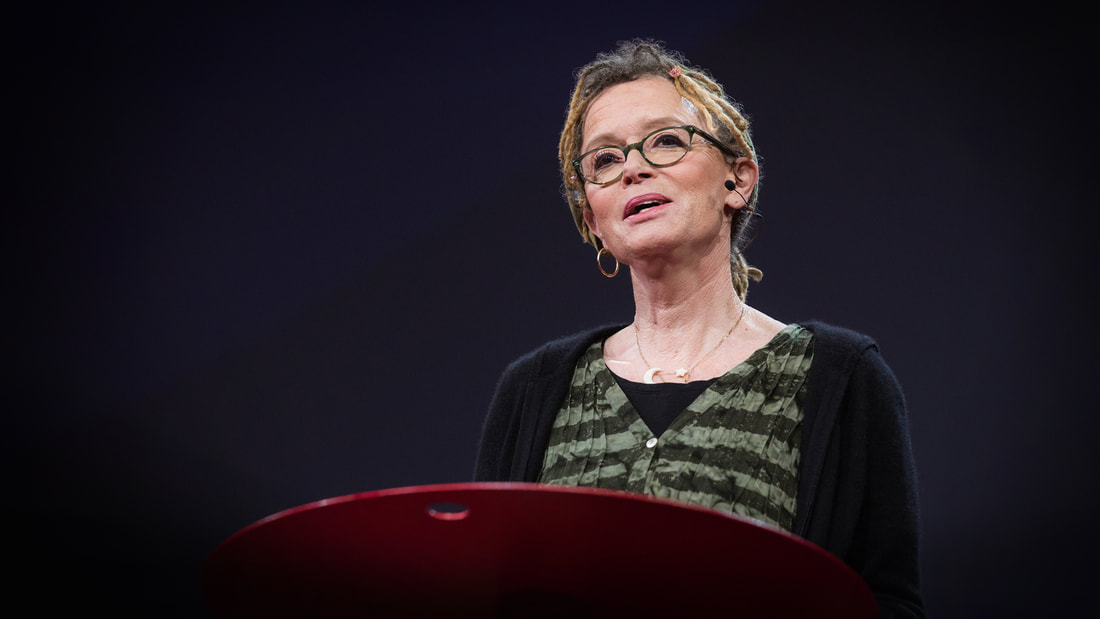|
This post, written by Kate Wiebe, originally was published on June 19, 2017, on the ICTG blog. Anne Lamott spoke at my church, in Santa Barbara, a couple years ago. She was the keynote speaker at a fundraiser for a church collaborative effort my husband helps to coordinate, offering shelter for neighbors without homes. Among various topics that evening, she described some of what she experienced in the aftermath of the mass shooting in Newtown, CT. As a volunteer Sunday School teacher, she recalled instinctively wanting to be with her kids and to provide them with more opportunities to create, to feel safe, and to grow. At ICTG, we often refer to that leadership activity as "adding good into the world." Over the years, we've noticed how easy it is to talk A LOT about the trouble in the world. But changing that trouble happens when we offer more goodness in response. Listening to Anne speak, I wondered, what helps a person lean in with goodness – like that – immediately in response to heartache? What makes a person think, I should go be a caring presence with kids, help them feel safe, and, possibly, find a glimpse of pleasure again, after great loss? It can seem too simple. Not nearly enough in the face of horrendous heartache. Like how, recently, at a training I was leading for youth leaders, a participant whose youth predominantly have experienced traumatic experiences balked at this sentiment. "Sorry, but, calming myself down and building relationships hardly seems like it will make enough of a difference in the face of so much overwhelming tragedy." It's certainly not a quick fix. In fact, many times, people who call us are hoping we might have a silver bullet or a magic pill – a miracle – that will instantly change the circumstances and forever relieve the pain and suffering. They would much rather not have to trod the Valley of the Shadow of Death. As one minister put it, "Can't I just scale up the rocky ledge, and skip this whole depressive Valley?"
Trauma, severe loss, moral injury, or ambiguous losses (like the loss of childhood, of innocence, of playfulness) can seem a lot like a hot potato. Most often we don't want to hold it, and we instinctively toss it away from us as soon as we can. Like when a group rashly removes a person who is making efforts to resolve what happened. Or when people refuse to talk about or acknowledge what happened in any way and instead encourage others to pretend like it didn't happen. Or when it seems like people are not responding at all, and rather just moving on and expecting "time" will heal the hurt. These efforts have all been tried and failed. Instead, they result in the exact opposite of what was intended. They prolong and even increase symptoms, as survivors bodies continue to insist on accounting for what's happened. As we become more conscious of the far-reaching effects of trauma on persons, families, organizations, and communities, leaders can be more effective in response by recognizing how attending to the effects of trauma permeating our congregations and communities today takes patience, being present, having courage to be honest about what has happened, and being compassionately curious in listening to the surviving individual or collective body express what it needs next for care and restoration. In his book, The Body Keeps the Score, traumatologist Bessel van der Kolk says he believes we are on the verge of becoming a "trauma conscious" country. In terms of the character and components of congregational care today, I believe we're on the verge of becoming a trauma conscious Church. As a Christian, I understand the Church to be the Body of Christ at work in the world today. We are becoming conscious of how wounded the Body is, has been, and also the ways the Body can become restored and respond more fully to wounds in the world – adding more good in response to profound sorrow.
That night, in Santa Barbara, Anne suggested, we allow our tears to wash us, cleanse us, and water the ground at our feet. Though a much slower act of response, nevertheless in my experience survivors find it miraculous when, in the presence of caring companions, they find their tears of lament leading everyone toward relief and refreshment. Through intentionally caring companionship, we witness over and over again how the path of the Valley of the Shadow of Death leads from a sense of feeling forsaken by God toward a sense of being led beside still waters. To learn more and gain restorative strategies for responding to collective trauma among congregations and communities, visit the ICTG congregational resources page. Recommended Reading: The Body Keeps the Score, by Bessel van der Kolk
1 Comment
|
�
CONGREGATIONAL BLOG
From 2012-2020, this blog space explored expanding understanding and best practices for leadership and congregational care.
This website serves as a historical mark of work the Institute conducted prior to 2022. This website is no longer updated. Archives
July 2020
Categories
All
|



 RSS Feed
RSS Feed
